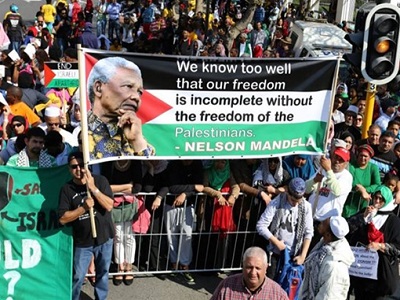
The Palestinian Ministry of Foreign Affairs said Monday it was instrumental in leading a boycott campaign against the Africa-Israel Summit planned for next month, after organizers of the summit announced the event was “postponed” without providing a future date.
Last month, reports emerged that several African countries were planning to boycott the summit. South African Ambassador to Lebanon and Syria Sean Benfeldt reportedly said that the country would not take part because the summit was viewed as a step by Israel to normalize relations between Africa and an “occupation state.” Sudan, Morocco, Algeria, Tunisia, and Mauritania also decided to boycott the gathering.
A statement released by the Israeli foreign ministry Monday morning said that the decision to “postpone” the event, set to take place in Lome in October, came “following the request of the President of Togo and after mutual consultations with the Prime Minister.”
KUDOS TO THE AFRICAN COUNTRIES WHO TOOK A STANCE AGAINST THE ISRAEL-AFRICA SUMMIT https://t.co/pYCzbfk5t2
— Tariq Ramadan (@TariqRamadan) September 11, 2017
Togolese President Faure Gnassingbe “emphasized that elaborate preparations are needed in order to guarantee the success of the event,” the statement said, and added that Gnassingbe “thanked and praised the (Israeli) Prime Minister for his determination to strengthen the cooperation between his country and Israel as well as for his personal engagement to guarantee the initiative to hold the summit.”
However, the Palestinian foreign ministry released a statement later on Monday, claiming that the collapse of the summit came as a result of diplomatic pressure upon instructions from Palestinian President Mahmoud Abbas.
“It’s obvious the decision was a result of sizable pressure,” the statement said. The Africa-Israel summit, according to the ministry, was an Israeli effort to “enhance Israel’s influence in the African continent and to make the continent dependent on Israeli technology and knowledge alone.”
An Israel-Africa summit planned for next month appears to have collapsed amid boycott by some African governments. https://t.co/ydBtCqCaoM pic.twitter.com/KFg3tKQieT
— The IMEU (@theIMEU) September 11, 2017
“The Arab League, along with the Organization for Islamic Cooperation, and other Arab and Islamic groups and parliaments of Arab countries, have adopted several initiatives seeking to counter and thwart that summit,” the statement concluded.
However, sources cited by Israel’s i24 News said that Togo had concerns about security at the summit, amid a crackdown on major anti-government protests in the country. Anonymous diplomatic sources also told Israeli newspaper The Jerusalem Post that the postponement had nothing to do with international pressure or domestic internal concerns, but was solely the result of unrest stemming from the protests.
The summit would have been the first of its kind – and would have reportedly been attended by two dozen heads of state including Israeli Prime Minister Benjamin Netanyahu, as well as 150 Israeli companies and potentially senior officials from countries that have no diplomatic relations with Israel.
Al Jazeera has 'evidence' #Israel is deporting unwanted #Africa-n migrants to #Uganda & #Rwanda in return for military & other forms of aid pic.twitter.com/O6mKkldTVj
— The Observer (@observerug) November 25, 2016
Leaders from Africa and Israel planned to discuss ways to enhance cooperation in the fields of technology, development, and security, with Israeli advertised as “the global leader in the fields of security and counter-terrorism,” offering “a validated track record of providing such expertise to its partner nations throughout the globe.”
Mustafa Barghouti, the former Palestinian information minister and general secretary of the Palestinian National Initiative political party, argued in an interview with Al Jazeera that Israel was attempting to “market” their products and surveillance services, especially at a time where the activities of the Palestinian-led Boycott, Divestment and Sanctions (BDS) movement are proving effective in curbing Israel’s economic success.
(Ma’an, PC, Social Media)





